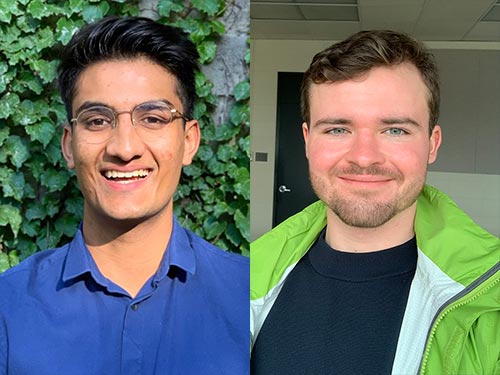University of Toronto students are the driving force behind a global undergraduate research competition that challenges teams to apply machine learning solutions to the impacts of climate change.
Dubbed ProjectX, the remote competition is organized by the U of T Artificial Intelligence student group (U of T AI) and is currently underway during the fall term. Upon final judging, winning teams will share a $70,000 prize pool.
Shardul Bansal and Elias Williams, co-presidents of U of T AI, lead a dedicated group of approximately 30 student organizers.
Bansal, a 4th year student studying computer science, says that they had been interested in hosting a competition that improved upon the structure of a typical hackathon.
“We love the opportunity to collaborate with other students but we felt that the hackathon model didn't give students enough time to come up with meaningful, impact-driven ideas,” says Bansal.

Williams, a 4th year student studying computer science and biochemistry, explains that he wanted the competition to do more than help a company improve its bottom line.
“As someone who studies artificial intelligence, that’s a depressing thought, because we talk about how it has the potential to become the most powerful tool that humans have made, yet we are using it to expedient ends,” he says.
Reflecting on the choice to focus this year’s inaugural ProjectX on climate change, Williams says the intent was to apply machine learning to areas that students might not typically encounter on common AI career paths, all while getting more students involved in climate change solutions.
“I think [climate change] is the most urgent problem that we have right now,” Williams says. “I think that pursuing technological solutions is the way that we’re going to get out of the hole that we’re in.”
The Competition
The ProjectX organizers had observed that students across North America were eager to improve their machine learning knowledge. With that in mind, they pitched the idea of the competition to analogous student groups at other universities.
“We received positive reactions all around,” recalls Bansal. “We started picking up some steam and had some universities reach out, asking to participate. As organizers, we were happy to accommodate as many bright minds as we could to try to solve this open-ended problem.”
Participating teams hail from top universities across Canada and the United States, but also further afield, including Chile, Brazil, Germany, and Poland. The organizers maintain a strict firewall between themselves and the student competitors from U of T.
Each team indicated their preference of three focus areas under the umbrella of climate change: infectious disease; weather and natural disaster prediction; or emissions and energy efficiency.
Once assigned a focus area, teams spoke with domain experts to scope out the problem that they wanted to solve. Teams are currently preparing research papers that will ultimately be judged by experts in each of the focus areas. Winners will be announced in mid-December.
The competition was formulated with guidance from U of T AI’s faculty advisor, Roger Grosse, an assistant professor in the Department of Computer Science and faculty member at the Vector Institute.
A Network of Support
The ProjectX organizers are quick to note the broad network of support that has helped them make the competition a reality.

Lana El Sanyoura, a first-year master’s student in computer science who graduated from U of T’s undergraduate computer science program earlier this year, serves as a member of the research team on ProjectX’s organizing committee.
“Something that's been very rewarding is the reaction of the academic community and the industry community to ProjectX,” she says. Partners have contributed everything from a custom-built collaboration platform to data sets and compute power.
“There’s a large network of people who use machine learning tools to tackle climate change-related issues,” says Williams. He notes that approximately 50 researchers have contributed their time and expertise to the competition.
ProjectX is supported by a range of partners, including Google AI, IBM, and U of T’s Schwartz Reisman Institute for Technology and Society.
A Greater Impact
El Sanyoura is excited by the prospect of expanding research opportunities for undergraduates, while also opening doors for their future careers through the networking and mentorship that happen throughout the competition.
Williams also views ProjectX as a way to demonstrate the strength of U of T’s undergraduate computer science program to peers across North America, in hopes of spurring more collaboration and ‘cross-pollination’ in the future.
“Fundamentally, I think ProjectX is about educating people to start thinking in the way we need to think in order to solve the problems that we need to solve,” he says.
U of T AI Conference
From climate change to political polarization, global pandemics to mental illness, we live in a world characterized by a web of urgent crises. The time to meet the challenges of the future is now. Is artificial intelligence our way to utopia? Or is machine learning tearing us apart?
The University of Toronto AI conference is a two-day event, attempting to answer these questions. A multidisciplinary gathering of the brightest minds from across the world with the goal of inspiring the next generation of thinkers, this is not an event to miss.
The conference takes place of January15 and 16, 2021 and over 2000 students, researchers, and industry leaders are expected to attend.
- Students interested in attending can register online.

